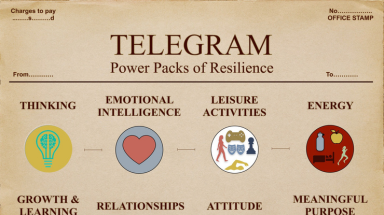Tom’s research into the subject of resilience over the last 8 years has provided him with a unique perspective on what the components are that feed into someone’s resilience.
On the back of his research Tom has created a model that allows coaches to explore resilience in a coachee-centred way, drawing on the most important elements of the model for the coachee. The model recognises that each individual will have their own particular relationship with resilience and it allows the coach to meet the coachee where they are.
When it comes to maintaining and replenishing resilience Tom’s TELEGRAM model focuses on 8 areas of life that are the power packs of resilience that are available to everyone.

The power packs that make up the TELEGRAM model are:
Thinking – For the most part our resilience is determined by the quality of our thinking and the way that we think about our thinking. Whether we are experiencing cognitive distortions, negative thinking patterns, unhelpful story-telling, or we are are just struggling to engage with positive ways of viewing our world, our thinking has a great impact on our resilience.
Emotional Intelligence – Connected to our ways of thinking is our own emotional intelligence. This concept incorporates our emotional responses to situations; our understanding of our emotions and the way we process them; the way we manage our emotions; and the way we interpret and respond to the emotional responses of others. Our understanding and management of our emotional architecture is always going to influence our resilience levels.
Leisure Time – This might seem an odd element to have as an essential power pack of resilience. However, ensuring that we have some time and space that is just for us, and that serves us in finding some balance in our life, is vital if we are to avoid becoming jaded and potentially burnt out. How much focus we have on the areas of activity in our lives that are going to make our hearts sing is also going to be a factor in our resilience.
Energy – The second E power pack of Tom’s TELEGRAM model provides us with the energy that we require to sustain or replenish our resilience. That means focussing on our energy SHED: Sleep, Hydration, Exercise and Diet. How well be balance our relationship with each of these energy factors is going to determine how well resourced we are to remain resilient through difficult times.
Growth and Learning – When it comes to resilience, our ability to learn from what we are experiencing, and then grow through adversity and challenge, is going to determine how well we develop and strengthen our future resilience.
Relationships – Probably the most important of the power packs, we cannot be resilient without the support of other people. We all need someone on our side if we are to maintain or replenish our resilience.
Attitude – Most people think of resilience as being about an attitude of grit, determination and inner strength, and whilst these ways of being have their place, there is another side to agile resilience that involves adaptability, self-efficacy and acceptance. Understanding when it might be helpful to engage with each of these attitudes is a key to staying resilient.
Meaningful Purpose – Many coachees come to coaching looking for some clarity about the direction that they’re heading in and whether this is the right path for them. Understanding the reasons why we think, feel and behave the way we do, and how we can connect with a sense of meaningful purpose is integral to maintaining our resilience.
To find out more about these power packs of resilience, and about resilience as a whole, you will find information on Tom’s book ‘Agile Resilience’ here




